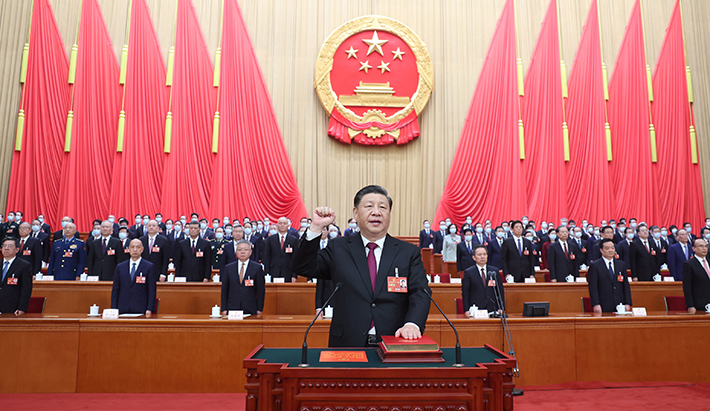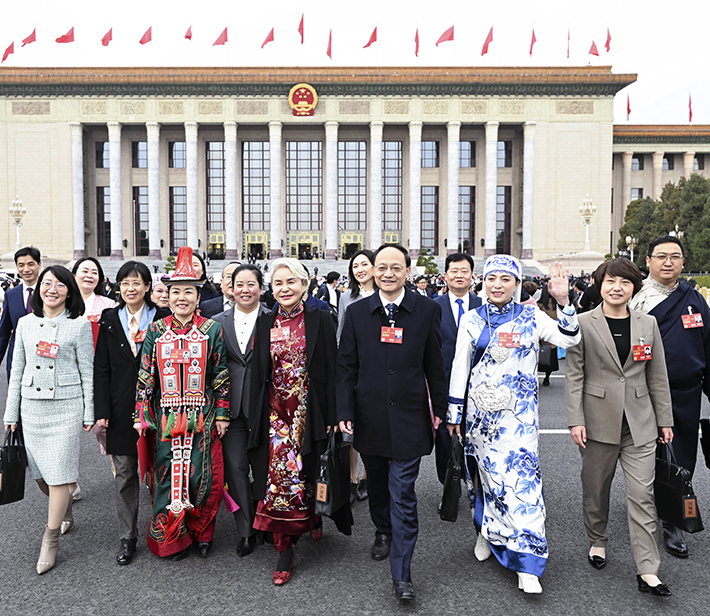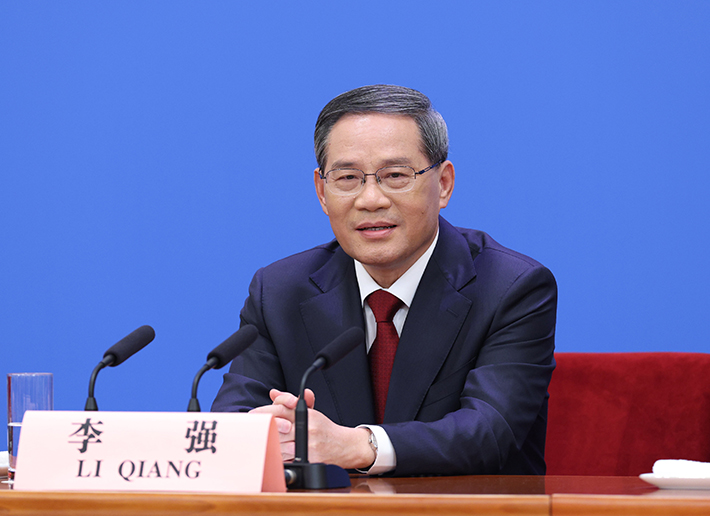|
||||||||||
| Home Nation World Business Opinion Lifestyle ChinAfrica Multimedia Columnists Documents Special Reports |
|
||||||||||
| Home Nation World Business Opinion Lifestyle ChinAfrica Multimedia Columnists Documents Special Reports |
| Current Cover Story |
| Fulfilling Meetings |
| The annual Two Sessions highlight high-quality development |
| By Ji Jing and Hu Fan 丨VOL. 15 April 2023 ·2023-03-27 |

Xi Jinping makes a public pledge of allegiance to the Constitution at the Great Hall of the People in Beijing, capital of China, on 10 March
The 14th National People’s Congress (NPC), China’s national legislature, concluded its first session on the morning of 13 March in Beijing, marking the completion of the annual sessions of the NPC and the National Committee of the Chinese People’s Political Consultative Conference (CPPCC), the top political advisory body, known collectively as Two Sessions.
During the NPC session, more than 2,900 deputies exercised their constitutional right to elect China’s state leadership. At the same time, over 2,100 members of the National Committee of the CPPCC, which concluded its first session on 11 March, elected the leadership of the top political advisory body.
Xi Jinping was unanimously elected Chinese president during the NPC session. He was also elected chairman of the Central Military Commission of the People’s Republic of China by a unanimous vote.
Other highlights included the adaptation of a revision to the Legislation Law and approval of a plan on reforming the institutions of the State Council, apart from routine agendas of the sessions. At the closing meeting, President Xi called for forming a mighty force for building a great modern socialist country and advancing national rejuvenation. “The relay baton of building a great modern socialist country and advancing national rejuvenation has been historically passed on to our generation,” he said.
Practical target
At the centre of public attention is the nation’s plan for economic growth for 2023. In the Report on the Work of the Government delivered by then Premier Li Keqiang at the opening meeting of the NPC session on 5 March, the GDP growth target for this year was set at around 5 percent.
The growth target of around 5 percent “is necessary to ensure stable growth, employment and prices,” according to a report on the implementation of the 2022 plan and the draft of the 2023 plan for national economic and social development, submitted by the National Development and Reform Commission, the country’s top economic planner, on 5 March.
“This suggests the central government’s focus is on high-quality economic growth. I believe this target is achievable,” Yu Miaojie, president of Liaoning University and a deputy to the 14th NPC, told Beijing Review while attending the annual legislative session in Beijing.
“The growth target is achievable in light of China’s average annual GDP growth rate of 6.2 percent in the past 10 years. Also, as the country has adjusted pandemic control measures, its economic vitality will be unleashed and the economy will see a recovery,” Jin Li, vice president of the Southern University of Science and Technology and a member of the 14th National Committee of the Chinese People’s Political Consultative Conference, told People’s Daily.
In January, the International Monetary Fund (IMF) raised its forecast for China’s economic growth to 5.2 percent in 2023, up 0.8 percentage points from its projection in October last year. Pent-up demand could also fuel a stronger rebound in China, the IMF said in its World Economic Outlook report released in January.
China’s economic rebound is having a significant positive spillover effect on the regional growth of Asia, Krishna Srinivasan, director of the Asia and Pacific Department of the IMF, said.
Srinivasan further said during the International Finance Forum One-on-One Global Dialogue on 3 March that a 1-percentage-point increase in China’s growth leads to a 0.3-percent growth in output level across Asia.
A pickup in China’s tourism has “had a huge impact” on countries like Thailand and Viet Nam, he said, adding that recovering consumption in China will boost the exports of its trading partners in the region.
Li Qiang, China’s new premier, also voiced full confidence in the country’s economic outlook at a press conference held after the conclusion of the First Session of the 14th NPC.
Citing the many factors of uncertainty and instability facing the world economy, Li told reporters that stabilising economic growth is a challenging task not just for China, but for all countries in the world this year. It is “no easy task and requires redoubled efforts” to achieve the economic growth target of around 5 percent in 2023 on a high base of economic output and amid new challenges, he said.
However, the premier said China’s development is supported by multiple advantages, including a vast market, a complete industrial system, abundant human resources, solid foundation for development, and most importantly, notable institutional strength.

Deputies to the 14th NPC leave the Great Hall of the People after the closing meeting of the First Session of the 14th NPC in Beijing, capital of China, on 13 March
Promoting growth
This year, China aims to create around 12 million new urban jobs, with a surveyed urban unemployment rate of around 5.5 percent, according to the Report on the Work of the Government. Other annual objectives include keeping the consumer price index increase at around 3 percent and grain output above 650 million tonnes.
The report unveiled a raft of measures to shore up growth this year, including a projected deficit-to-GDP ratio of 3 percent, 0.2 percentage points higher than the level last year, and 3.8 trillion yuan ($545.7 billion) of special-purpose bonds to be allocated to local governments.
To expand domestic demand, the government will prioritise the recovery and expansion of consumption, and improve the incomes of urban and rural residents, the report added.
China’s final consumption expenditure contributed more than 50 percent to domestic economic growth in 2022, which is low compared with developed countries. Therefore, China still needs to expand domestic demand and stimulate consumption.
High-quality development
In addition to measures aimed at bolstering growth, the report has underlined the importance of high-quality development in economic growth.
Liu Tao, vice president of Zhixin Investment Research Institute, told China Newsweek that this year’s report has given more emphasis to green and low-carbon development. The report has vowed to continue the transition to green development, improve the quality of the ecological environment and advance energy conservation and carbon reduction in key areas. “High-level environmental protection will not hinder economic growth but add new engines to growth instead and promote high-quality development,” Liu said.
President Xi said that high-quality development is the top priority in transforming China into a modern socialist country in all respects. He made the remarks on 5 March during a deliberation with NPC deputies from Jiangsu Province.
“A better balance must be maintained between effective rise in quality and reasonable growth in quantity, with quality first and priority given to economic and social benefits,” he said. “We must stay committed to deepening reform and opening up, further transform the growth model, and work for better quality with higher efficiency and more robust drivers of economic growth through reform, so as to accelerate the development of institutions and mechanisms for sustainable high-quality development,” he added.
The report also highlighted the role of private businesses in promoting high-quality growth. It said the government will protect the property rights of private enterprises and the rights and interests of entrepreneurs, encourage and support the private sector and private businesses in growing and expanding, and support micro, small, and medium-sized enterprises and self-employed individuals in business development.
During a joint group meeting with national political advisers from the China National Democratic Construction Association and the All-China Federation of Industry and Commerce on 6 March, Xi underlined the need to guarantee a level playing field for private businesses and state-owned enterprises through laws and institutional arrangements, encourage the private sector and its enterprises to grow larger and further lift market expectations and confidence.
More effective measures must be adopted to support the growth of smaller enterprises and self-employed individuals, while platform companies will be encouraged to play a greater role in creating jobs, in boosting consumption and in international competition, he said.
Yu from Liaoning University called for greater support for private businesses, especially ensuring their access to production inputs at the same prices as state-owned enterprises. According to him, the government and financial institutions should improve support for private enterprises. “Some private firms still face difficulties in financing and land use. As long as their operation costs are cut, improving profits will facilitate their business expansion and therefore expand employment and boost consumption,” he said.
According to Yu, China’s supply chains have weathered the challenges of the COVID-19 pandemic well, but logistics costs are still high and digital transformation and efficiency should be improved. The government should ramp up support for enterprises to develop offline supply chains as well as digital platforms. He also said the online procurement of materials through digital platforms will drive the upgrading of small and medium-sized enterprises.

Chinese Premier Li Qiang meets the press after the closing of the First Session of the 14th NPC at the Great Hall of the People in Beijing, capital of China, on 13 March
Improving opening up
China reiterated its commitments to opening up during the sessions. In his speech delivered on 13 March at the First Session of the 14th NPC, Xi noted that China’s development benefits the world, and China cannot develop itself in isolation from the world.
“We must solidly promote high-level opening up, not only making good use of the global market and resources to develop ourselves, but also promoting common development of the world,” he said.
The Report on the Work of the Government said China will intensify efforts to attract and utilise foreign investment and continue to open up the modern services sector.
At the press conference on 13 March, Premier Li said that China will further expand opening up this year in alignment with high-standard international trade rules, opening its door wider to the world with better business environment and services.
“Opening up is a basic state policy of China, and no matter how the external situation evolves, China will stick to pursuing this policy,” the premier told the press, saying that China welcomes investors from all over the world.
China has remained a favoured destination for global investment, Li said, citing statistics that foreign direct investment into the Chinese mainland, in actual use, reached a record high of more than $189 billion in 2022.
| About Us | Contact Us | Advertise with Us | Subscribe |
| Copyright Beijing Review All rights reserved 京ICP备08005356号-5 京公网安备110102005860号 |